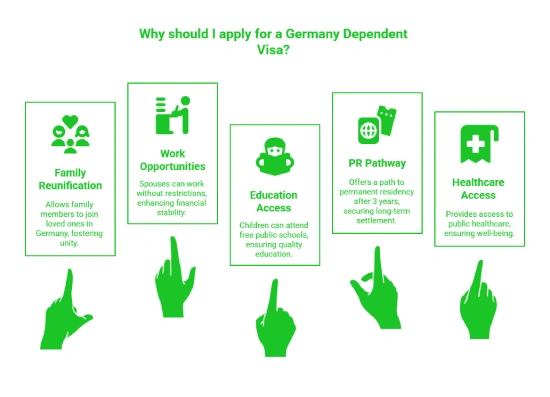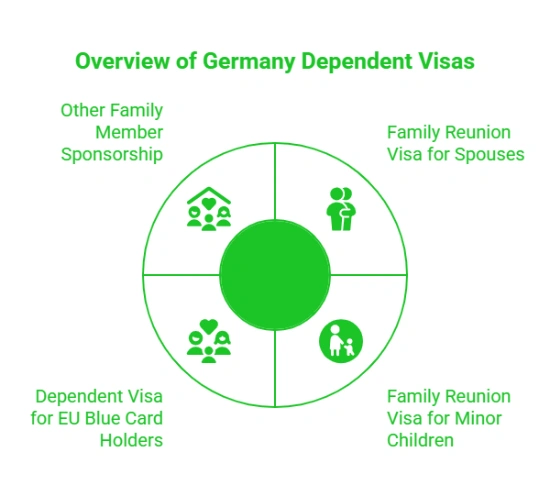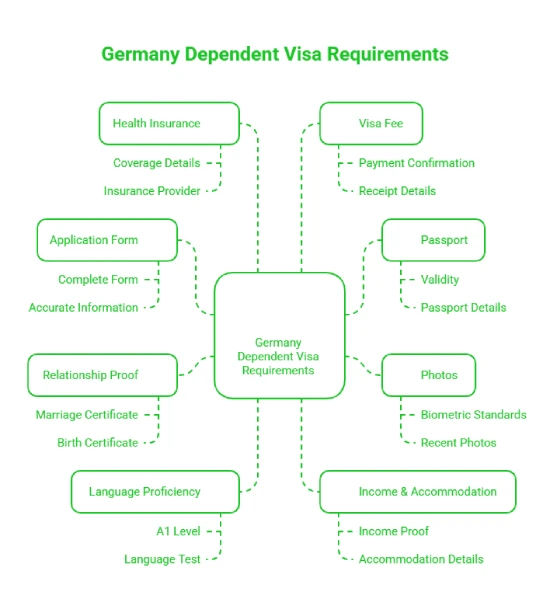Germany's Dependent Visa helps families reunite by allowing spouses, partners, and children to join their loved ones living in Germany. It supports long-term settlement, education, and work opportunities.

The Germany Dependent Visa, also known as the Family Reunion Visa, permits family members of individuals residing in Germany to join them. This visa is applicable to spouses, registered partners, and minor children of German citizens or legal residents. It is a long-term visa (Type D) that must be converted into a residence permit upon arrival in Germany.
*Looking to apply for a Germany Dependent visa? Sign up with Y-Axis to help you with the process.
Given below are the major types of Germany Dependent Visas:
For spouses or registered partners of German citizens or residents. Applicants must provide proof of marriage or partnership and may need to demonstrate basic German language skills (A1 level).
For children under 18 years wishing to join their parents in Germany. Proof of parentage and custody arrangements (if applicable) are required.
For family members of highly skilled professionals holding an EU Blue Card. The application process is streamlined, and spouses are generally exempt from language requirements.
In exceptional circumstances, other family members (e.g., parents, adult children) may be eligible for reunification under humanitarian grounds. These cases are assessed individually.

The eligibility criteria for a Germany Dependent visa are as follows:

Step 1: Determine Eligibility
Ensure both the sponsor and applicant meet the eligibility criteria.
Step 2: Gather Documents
Collect all required documents, ensuring translations into German or English if necessary.
Step 3: Schedule an Appointment
Book an appointment at the German Embassy or Consulate in Canada.
Step 4: Submit the application
Attend the appointment with all documents and pay the visa fee.
Step 5: Await the visa processing
The processing times vary; however, it is recommended to ensure you apply well in advance.
Step 6: Travel to Germany
Upon approval, travel to Germany and apply for a residence permit at the local Foreigners' Office.
The table below has a detailed breakdown of the Germany Dependent visa:
| Applicant | Fee (EUR) |
| Adults | € 75 |
| Children under 18 | € 37.50 |
Processing times can vary based on the applicant's country of residence and individual circumstances. On average, it takes 8 to 12 weeks to get a Germany Dependent visa from the date of application submission.
Note: Delays may occur if additional documentation is required or during peak application periods.
Yes, Canadian Permanent Residents can apply for a Germany Dependent Visa. Applications should be submitted to the German Embassy or Consulate in Canada. It's essential to provide proof of permanent residency status in Canada, along with all other required documents. Ensure all documents are translated into German or English, as required.
At Y-Axis, we make your Germany Dependent Visa journey easier with end-to-end support:
Explore what Global Citizens have to say about Y-Axis in shaping their future
Germany Opportunity Card Visa
Y-Axis Client Likith Kanalli on His Germ
Read More...
Germany Job Search
One of our client Vamsi has opted for Ge
Read More...
Germany Jobseeker Visa
Y-Axis received a great feedback from Po
Read More...
To apply for a Germany Dependent Visa, you will need:
The processing time for a Germany Dependent Visa (spouse) typically ranges from 8 to 12 weeks, but it may be longer depending on document verification or embassy workload. Some cases, especially involving non-EU nationals, can take several months. Applications are processed by the German mission in your country (e.g., in Canada), and timing can vary between embassies. It’s recommended to apply well in advance of your planned travel date and ensure all documents are complete and accurate to avoid delays.
To be eligible for a Germany Dependent (Family Reunion) Visa, the applicant must be an immediate family member, typically a spouse, registered partner, or child under 18—of someone legally residing in Germany. The sponsor must hold a valid residence permit, permanent residency, or be a German/EU citizen. Spouses are usually required to demonstrate basic German language skills (A1 level) unless exempt (e.g., if the sponsor is an EU Blue Card holder). The sponsor must also prove sufficient income and adequate housing to support the dependent. All applicants must meet health insurance and security clearance requirements.
The visa fee for a Germany Dependent Visa is €75 for adults and €37.50 for children under 18. The fee is payable at the time of your visa appointment, usually in local currency (e.g., CAD if applying from Canada). Fees are non-refundable, even if the application is rejected. Additional costs may apply for document translations, certifications, or courier services. Some categories, like spouses of EU citizens, may qualify for fee exemptions.
Yes, international students in Germany with a valid residence permit can apply to bring their spouse and children under the Family Reunion Visa. The student must prove sufficient income to support dependents (approx. €1,200/month or more) and provide accommodation. Spouses may need to show A1-level German language skills unless exempt. Once approved, dependents can stay in Germany for the same duration as the student’s permit. Spouses may also apply for work authorization depending on local regulations.
Spouses must apply for a National (Type D) Family Reunion Visa through the German Embassy or Consulate in their country of residence (e.g., Canada). The application involves submitting completed forms, marriage certificate, proof of A1 German proficiency (unless exempt), sponsor’s residence permit, income proof, and health insurance. After the visa is issued, the applicant must register in Germany and apply for a residence permit. Spouses are generally eligible to work upon arrival if they meet all conditions.
The initial Germany Dependent Visa is typically valid for 90 days as a long-term (Type D) entry visa. Once the dependent arrives in Germany, they must register with the local authorities (Ausländerbehörde) and apply for a residence permit. The residence permit’s duration usually matches the sponsor’s visa or residence status and can be extended. After a few years of legal residence, dependents may become eligible for permanent residency and eventually citizenship, provided they meet the criteria.
Yes, Germany offers a dependent visa called the Family Reunion Visa. It enables family members such as spouses, registered partners, and children of residents in Germany to live together. The visa allows reunification with German citizens, EU/EEA residents, or foreign nationals holding valid German residence permits. Applicants must meet eligibility criteria such as proof of relationship, income, housing, and in some cases, language ability. After arrival, dependents must apply for a residence permit to stay long-term.
In most cases, Germany’s Family Reunion Visa is not available for parents of adult children. However, under exceptional humanitarian grounds, elderly parents may be allowed to join adult children if they require long-term care and no one in their home country can provide it. These applications are rare and reviewed on a case-by-case basis. More commonly, the visa is granted for minor children to join parents or for spouses to reunite. Legal advice is often recommended in such cases.
There is no real difference between a Germany Dependent Visa and a Family Reunion Visa as they are both referred to the same thing. “Dependent visa” is a more common term people use around the world, but in Germany, the official term is “Family Reunion Visa.” Whether you are joining a spouse, partner, or child in Germany, the application process, documents, and fees are the same.